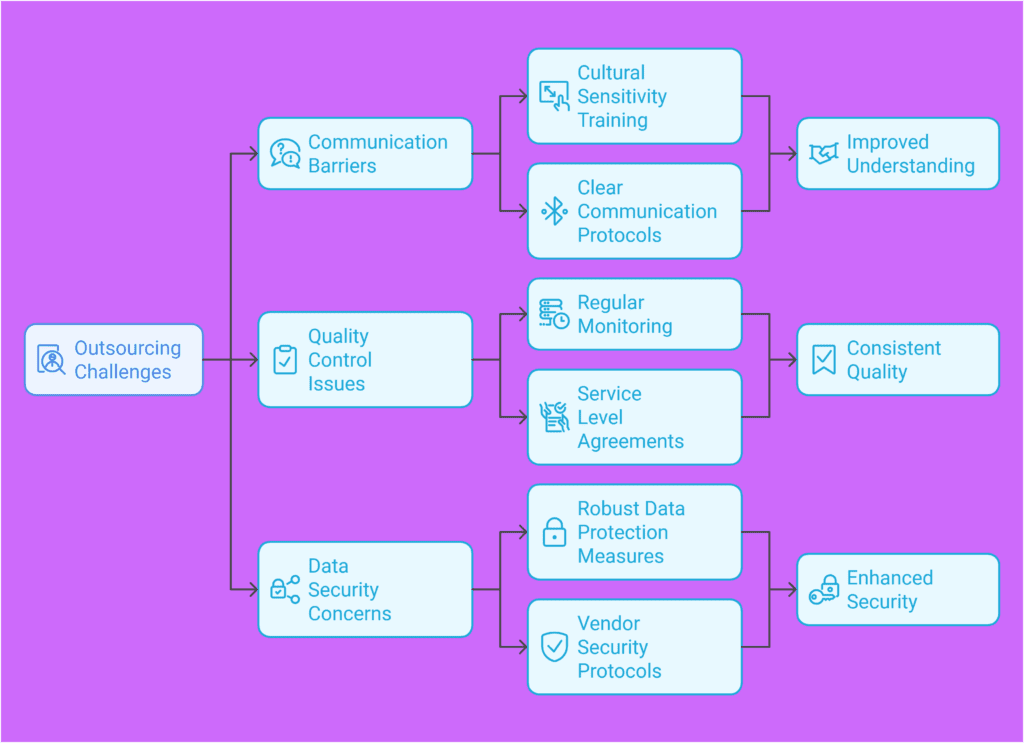The Benefits of Outsourcing in 2024: Business Gains and What’s Next for 2025
31 Dec 2024 By: Maria Rush
Updated
Understanding the Concept of Outsourcing
The benefits of outsourcing include cost savings and increased efficiency. Companies delegate tasks to external vendors, focusing on core operations.
Outsourcing simplifies processes by assigning work like customer service or manufacturing to experts. This strategy improves productivity and reduces expenses.

What is outsourcing?
Outsourcing transfers tasks like IT support, accounting, or logistics to external providers. It frees internal resources, promoting growth and innovation.
By delegating non-core tasks, businesses focus on strategic goals. For example, a tech company may outsource customer support to drive product development and stay competitive.
Evolution of Outsourcing Over the Years
The benefits of outsourcing has grown from a cost-saving tool to a way of enhancing business capabilities. Digital technology has played a major role in this transformation.
Companies now hire global talent online, working across time zones for 24/7 operations. Cloud computing and collaboration tools ensure seamless teamwork.
Continue reading for more insights:
What is Customer Service BPO?
Knowledge Process Outsourcing (KPO)
What is Great Customer Service?
The Rise of Outsourcing in 2024
In 2024, companies significantly shifted their views on outsourcing, embracing it more than ever before. This change spanned across various industries, driven by undeniable benefits such as cost savings, flexibility, and access to specialized skills. In fact, the global outsourcing market reached $769.7 billion in 2024, reflecting its essential role in modern business operations
Factors Driving the Increase in Outsourcing
Economic pressures pushed many companies to outsource. Rising labor costs and the need for greater efficiency fueled this shift.
Outsourcing also offered workforce flexibility, letting businesses quickly adapt to changing demands.
Advances in technology further enabled outsourcing. Cloud computing and collaboration tools allowed seamless management of remote teams.
These tools improved communication and performance tracking across time zones, boosting productivity and accountability.
Industries That Benefited Most from Outsourcing
In 2024, sectors like technology, healthcare, and manufacturing benefited most from outsourcing due to the need for specialized skills often unavailable locally. For example, the adoption of manufacturing compliance AI agents enabled manufacturers to streamline regulatory processes and ensure ongoing compliance with industry standards.
Healthcare organizations outsourced patient support, allowing more focus on core care and improving service quality.
In technology, software development and IT support were key areas for outsourcing. Offshore partnerships cut costs and provided global expertise.
This access to diverse skills fueled innovation and sped up projects, giving companies a competitive edge in the digital market.
The Tangible Benefits of Outsourcing in 2024
Outsourcing delivered clear benefits to businesses, directly impacting profitability and growth.
From reducing costs to accessing global talent, companies saw significant improvements this year.
Cost Efficiency and Savings
Companies outsource primarily for cost efficiency, often reducing operational expenses through external services. According to recent reports, businesses can achieve average cost savings of 15-30% by outsourcing, making it one of the most compelling reasons to partner with external providers
Outsourced staff usually earn lower wages than full-time employees, freeing funds for areas like marketing or product development.
Outsourcing also cuts hiring and training costs. Businesses avoid expenses for benefits, office space, and equipment, improving their bottom line.
This approach reduces financial risk and helps companies stay agile, adapting quickly to economic shifts in a dynamic market.
Access to Global Talent and Expertise
Outsourcing links businesses to global talent, providing access to skilled professionals unavailable locally. Around 65% of companies outsourced tasks in 2024 to tap into specialized expertise, particularly in IT services, digital marketing, and software development
Hiring international experts keeps businesses competitive in their markets.
This global reach adds diversity, fostering fresh ideas and creative solutions. Specialized skills enable advanced technologies and methods.
By boosting productivity, companies position themselves as industry leaders, ready to adapt to trends and meet changing demands.
Increased Focus on Core Business Functions
By delegating non-core tasks, businesses focused on strategic goals and innovation. In 2024, 57% of businesses outsourced to concentrate on their core competencies, allowing internal teams to drive product development and market expansion
With routine duties delegated, employees can channel their efforts into strategic projects. This focus drives innovation, improves performance, and fosters business growth.
Outsourcing also enhances employee satisfaction. By handling higher-value activities, staff feel their skills are effectively utilized, boosting morale and productivity.
Additionally, this strategy allows companies to stay agile. By focusing on core strengths, they can quickly adapt to market shifts and maintain a competitive edge in their industry.

The Intangible Benefits of Outsourcing in 2024
Outsourcing offered not only tangible benefits but also significant intangible advantages that shaped company performance.
Flexibility became a vital asset. Businesses could quickly adjust resources to meet shifting demands, ensuring adaptability during uncertain times.
Creativity is one of the benefits of outsourcing. Diverse expertise brought fresh ideas, fostering innovative solutions to complex challenges.
These intangible benefits played a key role in helping companies stay resilient and competitive in a rapidly changing business environment.
Enhanced Business Flexibility
Outsourcing boosts business flexibility by enabling companies to scale operations up or down based on market conditions. Cloud computing played a key role in this adaptability. In fact, 90% of businesses leveraged cloud solutions for remote outsourcing, ensuring seamless collaboration across time zones
This adaptability helps businesses respond to changes without overextending resources. During peak seasons, they can outsource to increase production and meet demand without heavy investments in infrastructure.
In slower periods, outsourcing allows businesses to scale back, reducing costs and optimizing resource management for greater efficiency. This dynamic approach ensures agility and resilience in fluctuating markets.
Innovation and Technological Advancement
Outsourcing conserves resources for innovation by utilizing vendors specialized in specific technologies, enhancing a company’s capabilities.
Through external expertise, businesses access advanced tools and practices otherwise out of reach. This partnership often brings cutting-edge solutions like AI and machine learning, streamlining operations and improving customer experiences.
Additionally, fresh ideas from external partners can inspire internal teams, fostering a culture of innovation. This collaboration drives progress and keeps the organization competitive in a fast-evolving market.
Risk Management and Mitigation
Outsourcing enables companies to share risks by partnering with experienced vendors, reducing challenges in operations and compliance.
This shared responsibility creates a safety net, increasing resilience during uncertain times. By working with multiple partners, businesses can better handle regulatory changes and market fluctuations.
One of the benefits of outsourcing is access to specialized expertise, helping companies anticipate and address disruptions from economic shifts or technological advances.
This proactive approach safeguards operations and strengthens the company’s reputation as a reliable and adaptable player in the market.
What are the challenges of outsourcing?

While outsourcing offers many benefits, it also presents challenges. Businesses must carefully manage the integration of external providers into their operations.
Recognizing potential pitfalls is crucial to achieving successful outcomes. Proper planning and oversight ensure outsourcing aligns with company goals.
Communication Barriers and Cultural Differences
Communication is a key challenge in outsourcing. Time zone differences and language barriers can lead to misunderstandings and delays.
Cultural differences often cause mismatched expectations. For example, a simple request in one culture might seem demanding in another, creating frustration.
To address this, businesses can invest in cultural sensitivity training and establish clear communication protocols. Regular check-ins and collaborative tools help keep everyone aligned.
These efforts foster better understanding, reduce miscommunication, and promote a smoother, more cohesive working relationship between all parties.
Quality Control and Service Delivery Issues
Quality control is another significant concern in outsourcing. Ensuring that external services align with company standards can be difficult.
To maintain quality, regular monitoring and clear guidelines are essential. Investing in oversight helps protect the company’s reputation.
Developing detailed service level agreements (SLAs) with clear expectations and performance metrics is vital. Feedback loops allow both parties to discuss performance and drive improvement.
Fostering transparency and accountability ensures consistent service quality. This proactive approach helps resolve issues early, strengthening the outsourcing partnership.
Data Security and Privacy Concerns
Data security is a critical concern in outsourcing. Sharing sensitive information with third parties can expose businesses to potential vulnerabilities.
To mitigate risks, companies must implement robust data protection measures and carefully vet outsourcing partners.
Due diligence should include evaluating vendors’ security protocols and ensuring compliance with regulations like GDPR or HIPAA. Advanced encryption methods and regular security audits are essential safeguards.
Training employees on secure data handling and establishing a clear incident response plan further enhance security. These steps protect data, foster trust, and strengthen the company’s reputation.
Trending Now
The healthcare IT outsourcing market is growing quickly as providers outsource tasks like data management, cybersecurity, and cloud computing.
This trend helps reduce costs, improve efficiency, and meet compliance requirements like HIPAA and GDPR. Businesses can strategically leverage IT outsourcing services to address complex technological challenges in the healthcare sector. It also provides access to global expertise and advanced technology.
Trends such as telemedicine, AI integration, and blockchain are transforming the sector, enhancing security and care delivery.
However, as data complexity and cyber threats rise, outsourcing remains vital for tackling healthcare IT challenges effectively.
Conclusion
In conclusion, 2024 was a pivotal year for outsourcing, showcasing its many benefits, such as cost efficiency, access to global talent, flexibility, and innovation. As businesses prepare for 2025, they can continue leveraging outsourcing to stay competitive in an ever-evolving market.
However, challenges like communication, quality control, and data security remain. In 2025, companies should refine strategies to maximize these advantages while addressing risks.
“Just be really good at one thing. The best, actually. And let others handle what you’re not good at.”
— Kevin E. Kruse
As you look ahead to 2025 and consider refining your outsourcing strategies, remember that HelpSquad is here to support your business’s growth and innovation. With our cost-effective and skilled bilingual agents, you can enhance your customer service and back-office operations, starting at just $8.50 per hour. Don’t miss the opportunity to boost your efficiency and stay competitive in the ever-evolving market. Start your trial with HelpSquad BPO today and experience the difference that professional virtual assistants and a 24/7 customer service team can make for your business.
FAQ’s
What were the biggest benefits of outsourcing in 2024?
According to the article, the biggest wins were cost efficiency, access to global talent, and letting internal teams focus on core business functions (plus flexibility, innovation, and risk-sharing as “intangible” benefits). helpsquad.com
How did U.S. companies get cost savings from outsourcing worldwide in 2024?
The guide explains that companies often save money by using external teams with lower total labor costs and by cutting internal expenses like hiring/training, benefits, office space, and equipment, freeing budget for growth areas. helpsquad.com
What kind of cost savings can businesses expect from outsourcing?
The article cites reports estimating average cost savings of about 15–30% from outsourcing, depending on what’s outsourced and how the engagement is managed. helpsquad.com
Will outsourcing continue to grow in 2025?
The article argues the drivers are still in place, economic pressure, rising labor costs, the need for efficiency, and better cloud/collaboration tools, so outsourcing remains positioned to keep expanding into 2025. helpsquad.com
What work do companies commonly outsource (especially in IT)?
It defines outsourcing as shifting functions like IT support, accounting, logistics, and customer service to external providers, and notes IT support and software development were key outsourcing areas in tech. helpsquad.com
How much does it cost to outsource IT support?
Pricing varies by scope and model (hourly “break-fix,” per-user, per-device, or flat monthly contracts). Many providers cite ranges like roughly $150–$400 per user/month for managed IT packages, with other models priced differently. Use this as a starting point and get quotes based on your SLA, security needs, and coverage hours. vc3.com+2Clutch+2
What are the biggest risks or challenges with outsourcing, and how do you reduce them?
The article flags communication/cultural gaps, quality control issues, and data security concerns. It recommends clear communication protocols, monitoring with defined standards, strong SLAs, and careful vendor security vetting (including compliance needs like GDPR/HIPAA where relevant). helpsquad.com
Where does HelpSquad get the data or support for its 2024 outsourcing claims?
On-page, the article includes external citations for key stats (like market size and cost-savings ranges), and it’s clearly labeled with an author and an update date (published Dec 31, 2024; updated May 20, 2025), which helps readers assess freshness and credibility. helpsquad.com
Which industries benefited most from outsourcing in 2024?
The guide highlights technology, healthcare, and manufacturing, driven by demand for specialized skills and faster execution. helpsquad.com


